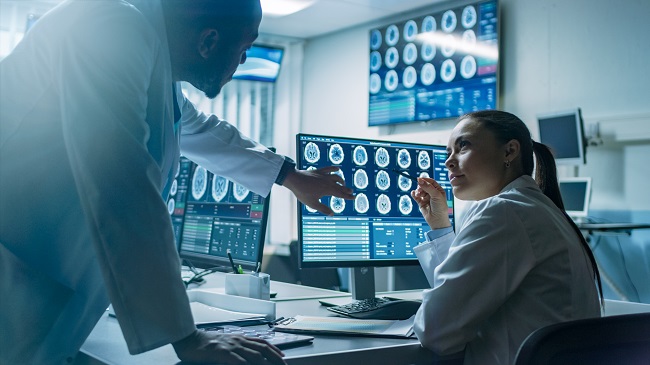Are you passionate about science or health care but undecided on your career path? An undergraduate degree in biomedical science is a great place to start!
Biomedical science includes any course of study related to biology as it affects health care. It includes classes such as physiology, anatomy, epidemiology, biochemistry, nutrition and kinesiology. Biomedical sciences are the foundation of knowledge for all health care professionals.
A bachelor’s degree in biomedical science positions you for a wide variety of career opportunities. The field is constantly evolving and always in demand in order to meet ongoing health care needs. It is also a field that has the resources necessary to expand. As technology continues to progress and develop, new career paths within the field of biomedicine are emerging.
Here are a few in-demand career paths within the biomedical science field that you should know about:
Neuroscientist
With the advancement of computer technology and artificial intelligence (AI), neuroscience, which involves the study of the brain’s nervous system and neuronal cell biology, has been steadily expanding. These three fields have become more interconnected as scientists continue to develop various types of technology, including robotic arms that allow paralyzed patients to reach out and grab objects as they would with a natural arm.

According to Nature Magazine, AI can now emulate how the brain performs certain computations enabling neuroscientists to obtain further insights into how the brain works–an effort that might lead to machines that can take on more human-like intelligence. While neuroscientists need advanced degrees, their salaries typically average about $77,000/year.
Epigenetics researcher
Epigenetics is an emerging field about external modifications to DNA that turn genes “on or off” and affect how genes are expressed—all without changes to the DNA sequence. For example, environmental factors like diet and pollution exposure can both impact a person’s epigenome.
According to the National Human Genome Research Institute, until recently, scientists thought that human diseases were caused mainly by changes in DNA sequence and infectious agents such as bacteria and viruses, or environmental agents. New research has shown that epigenome changes can also cause or result from disease. While this field has been around for several years, exactly how epigenetics impacts disease still remains a mystery.
Today, millions of dollars in funding and other resources are being dedicated into the study of epigenetics. In July 2020, National Institutes of Health researchers published a study comparing epigenetic differences between humans and domestic dogs to provide an emerging model of aging. Other recent research published in Genome Biology this year shows that epigenetics changes could signal increased risk of cancer.
With the rise in cancer, inherited disorders, viral infections, etc., Reports and Data, a market research and consulting company, expects the epigenetics market to reach $19.12 billion by 2026.
If you’re interested in performing research, this newly established field may be right for you.
Genetic counselor
Once costly and time-consuming, genetic testing has now become both widespread and affordable. In addition to commercial companies that offer genealogical DNA tests, the public also has the ability to test their DNA to learn how inherited diseases might affect them.
That’s where genetic counselors come in. Often in a clinic or hospital setting, genetic counselors help patients choose which genetic tests might be right for them and, based off of results, how to make informed decisions regarding their health. Today most health insurance providers cover these services too.
This field has grown so much in the last decade that genetic counseling was recently named the second most in-demand job in the life sciences, according to BioSpace, an industry news site. From 2018 to 2028, the Bureau of Labor Statistics (BLS) projects a 27% growth in genetic counselor jobs.
Unlike physicians and researchers, genetic counselors typically don’t need as much schooling. After obtaining a bachelor’s degree, genetic counselors generally need to receive their Master’s in genetic counseling.
Cytogenetics technologist
Cytogenetics is a branch in the growing field of genetics that involves examining chromosomes to identify structural abnormalities. Unlike genetic counselors who discuss genetic testing with patients, cytogenetic technologists actually perform genetic testing. Because this field has led to new discoveries in cancer research, inherited genetic abnormalities and genome evolution, its practical applications continue to expand.
With just four-year degree and additional certification depending on which state you live in, you can become a cytogenetic technologist who works alongside doctors to help diagnose and treat a variety of genetic diseases such as congenital disorders, blood disorders, tumors, and birth defects.
According to the Mayo Clinic, the emphasis on personalized medicine and use of targeted therapies will increase the demand for cytogenetic technologists in the years to come.
Cheminformatics
Cheminformatics combines the field of chemistry (including its applications to biology) with computer and information science techniques in order to create chemical databases and virtual libraries.
According to the American Chemical Society, much work remains to be done on integrating chemical information, mining information from journal articles, and applying this information to understanding and predicting how chemicals affect entire systems, including human bodies.

Degrees in both biomedical sciences and information technology (IT) can be especially helpful for newly developing cheminformatic job opportunities at national laboratories and various government agencies, including those doing research on toxicology and biomedicine.
New advances in technology means more job opportunities and demand. Graduates seeking work in this field are no longer limited to working at hospitals, clinics and laboratories. Today, they often work in a wide range of industries including manufacturing, computer systems design, government, pharmaceutical companies and more.
A BS degree in biomedical science can be a gateway to working in these exciting fields!
{{cta(‘5771641f-24a4-496d-9f28-7f6adf858fb1’)}}




0 Comments